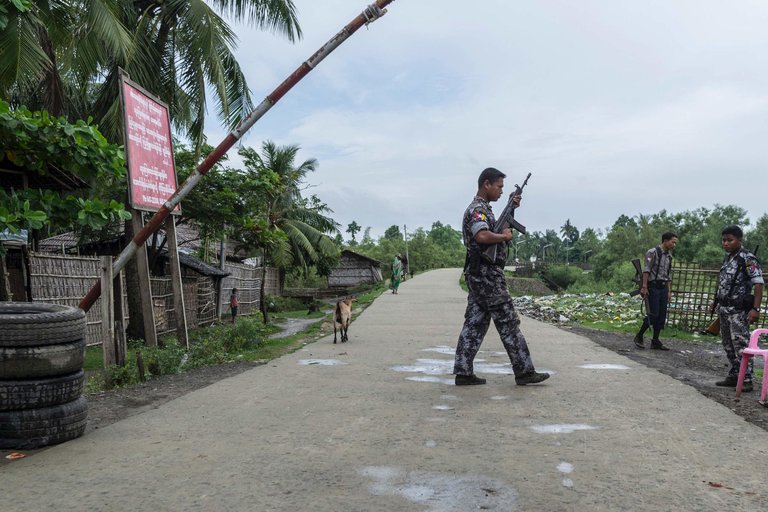Violence has continued in a restive area of Myanmar since nine police officers were killed there over the weekend, the government said on Wednesday, as a rights group said it had documented what appeared to be extrajudicial killings of Muslims by the army.
The news that 12 people had been killed in clashes on Tuesday in Rakhine State, reported on Wednesday in government newspapers, suggested a significant escalation of tension in a region known for bitter sectarian conflict, as did the circulation online of videos depicting what appeared to be heavily armed Muslim fighters in Myanmar.
The tension presents a challenge for the government led by Daw Aung San Suu Kyi, which took office in March and has tried to promote peace and ethnic reconciliation in border areas like Rakhine. Despite those pledges, her government has faced accusations of being unsympathetic to the plight of the Rohingya, a persecuted Muslim minority in the Buddhist-majority country.
“The latest spread of violence not only has unhelpful implications for the achievement of nationwide peace, but it is also exacerbating the most difficult communal, religious and ethnicity conflict in the country,” said Tom Kramer, a researcher at the Transnational Institute, a nonprofit consultancy in the Netherlands that has studied ethnic conflict and reconciliation in Myanmar.
The attacks on police officers occurred early on Sunday in three places in the townships of Maungdaw and Rathedaung, and they were followed by skirmishes in Maungdaw, according to a report by the Center for Diversity and National Harmony, an independent nonprofit organization that receives funding from the United Nations and from the Norwegian and Swiss governments.
The report said that the initial assaults — in which attackers used knives, guns and slingshots — had left at least 17 people dead, including eight attackers and the nine officers, and that subsequent attacks had caused 12 more deaths. It said that violence had prompted travel restrictions in and out of Maungdaw and that Muslim shops there had closed.
Rakhine, which borders Bangladesh, was the site of violence between Buddhists and Muslims in 2012 that left hundreds dead and underscored the deep ethnic intolerance that pervades the area.
Matthew Smith, the chief executive of Fortify Rights, a Southeast Asia advocacy group that monitors human rights in Rakhine, said on Wednesday that the army appeared to be mounting an offensive against Muslims in Maungdaw and that witnesses there had described extrajudicial killings by soldiers.
“We’ve spoken to eyewitnesses in Maungdaw Township who report witnessing the Myanmar Army shooting and killing Rohingya men,” Mr. Smith said.
He added that Fortify Rights had confirmed three killings so far and that witnesses said all three victims had been unarmed. Mr. Smith said that the Myanmar authorities had a history of cracking down on local populations in response to perceived security threats, and that the killings his group had documented appeared to be part of that trend.
Neither witnesses nor a government spokesman could immediately be reached for a response to Mr. Smith’s assertion.
Also on Wednesday, two videos circulated online that appeared to show a group of heavily armed Rohingya men calling for jihad and saying they were being pursued by army helicopters.
“I am speaking to all Rohingya brothers around the world,” a man in one of the videos said in the Rohingya language, according to a translation provided by Fortify Rights. “Please prepare for jihad and come here.”
A government official, speaking on the condition of anonymity because of the delicate nature of the issue, said that the video appeared to be authentic. Mr. Smith agreed, saying there were indications that it had been filmed in Rakhine and that Myanmar Army helicopters had been deployed after the attacks on Sunday.
But Mr. Smith said the sight of heavily armed Rohingya men in Rakhine was highly unusual and should not be taken as a sign of widespread militancy among Muslims in the area.
The roughly one million Rohingya in Rakhine are officially stateless, having been denied citizenship by the Myanmar authorities, who call them Bengalis and say they are from Bangladesh, even if their families have been in Myanmar for generations.
Source: NYTimes

